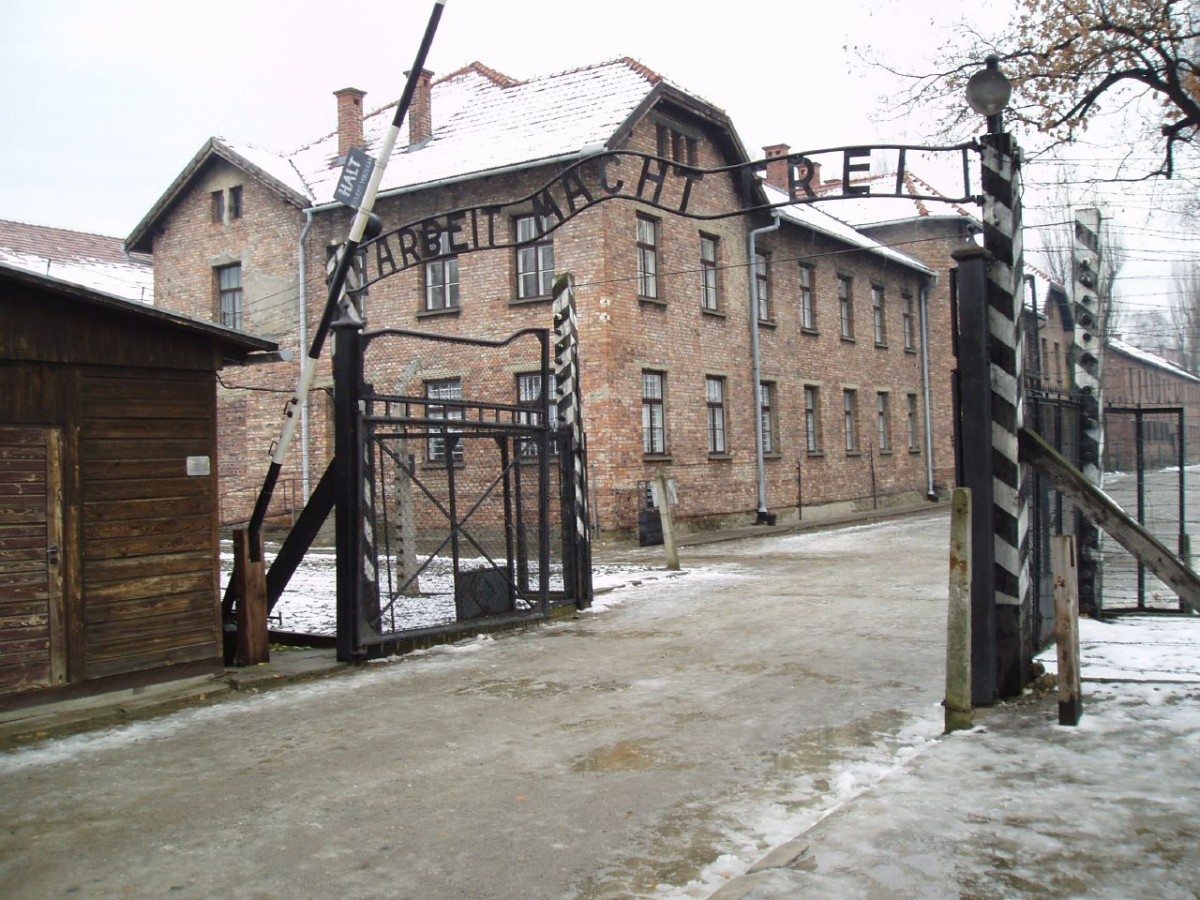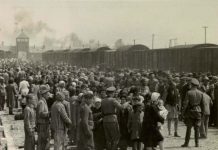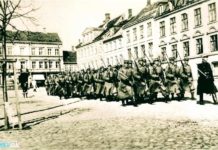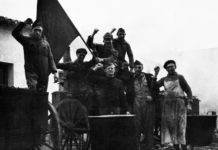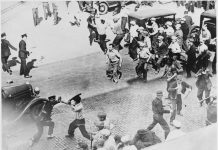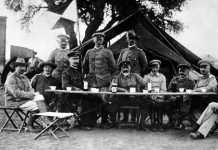January 27 is the international Holocaust Memorial Day. You will find links to web sites and articles in English below.
Linkbox om holocaust (det nazistiske folkemord på jøder i Europa) og den største KZ-lejr og udryddelsesanlæg Auschwitz-Birkenau.
(Socialistisk Bibliotek, påbegyndt juni 2010- )
Den 27. januar 1945 blev koncentrationslejrkomplekset Auschwitz-Birkenau befriet af sovjetiske tropper. Og karakteren af folkemordet på Europas jøder blev klarlagt og åbent.
Datoen 27. januar er nu international Auschwitz-dag. Se Auschwitz-dag (Wikipedia.dk)
Indhold:
- Leksikalt/encyclopedias & web sites
- Artikler/Bøger / Articles & books; in English & nordisk.
- Litteratur
- Se også på Socialistisk Bibliotek
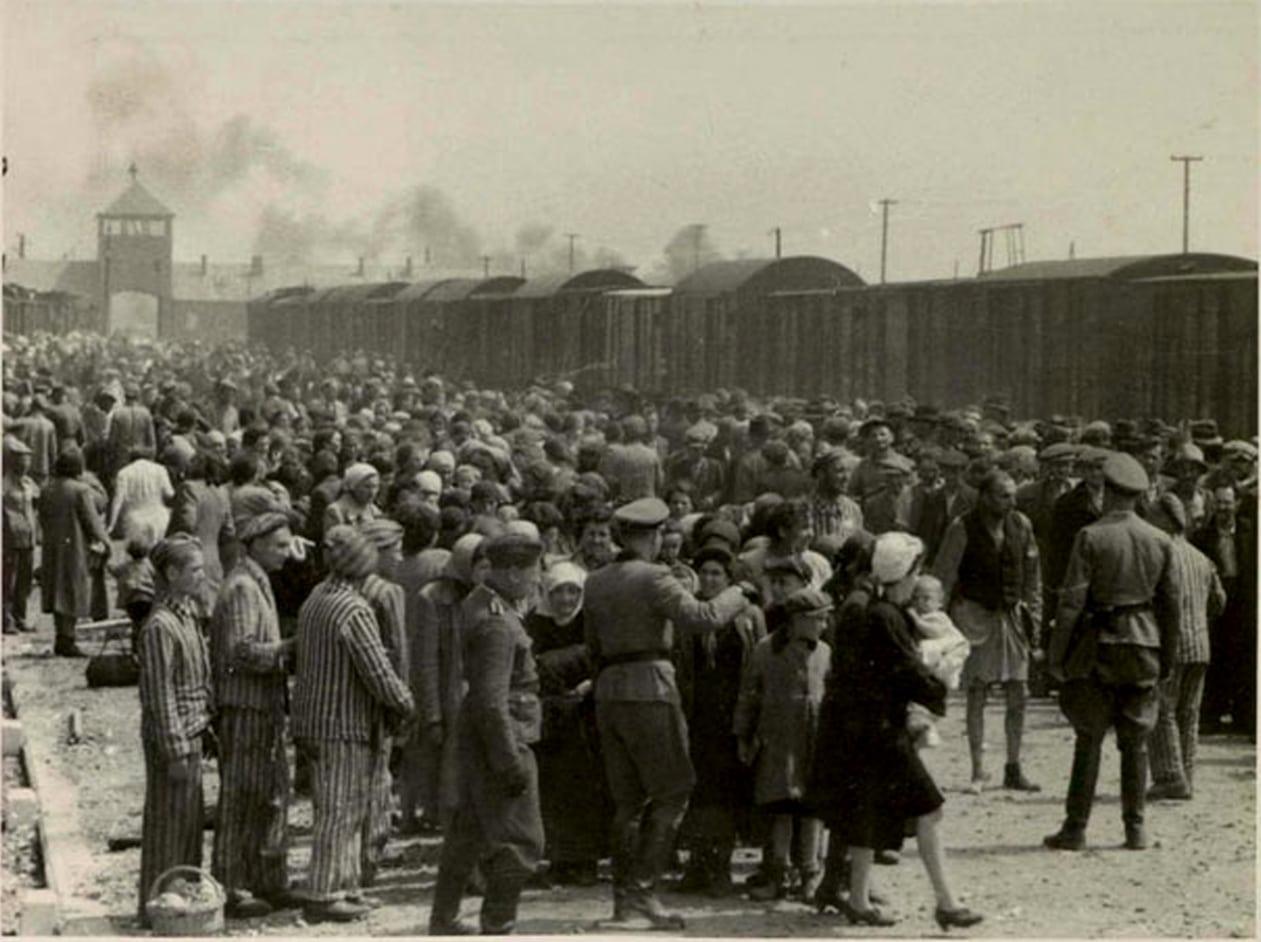
The Auschwitz Album (Yad Vashem.org). “The Auschwitz Album is the only surviving visual evidence of the process leading to the mass murder at Auschwitz-Birkenau.” With 56 pages and 193 photographs. See also The Auschwitz Album (Wikipedia.org). “… the only surviving visual evidence of the process leading to mass murder at Auschwitz-Birkenau.”
[sta_anchor id=”leks” /]
Leksikalt & sites
- Auschwitz (Leksikon.org)
- Holocaust (Leksikon.org)
- Auschwitz (Denstoredanske)
- Holocaust (Denstoredanske)
- Aldrig Mere: Holocaust og and folkedrab. “AldrigMere.dk indeholder tilbud til grundskolen, ungdomsuddannelserne og VUC om Holocaust og andre folkedrab.”
- Holocaust (Folkedrab.dk). Udg. af Dansk Institut for Internationale Studier – Holocaust og folkedrab.
Se også her Temaer: Danmark og Holocaust – Holocaust-benægtelse – Holocaust og de danske østfrontfrivillige – Modstand – Fokus på Auschwitz.”
Se også: Holocaust benægtes for sjov. Af Thomas Hoffmann (Videnskab.dk, 27. januar 2009). Om de danske holocaust-benægtere/revisionister’s argumenter. - Auschwitz-Birkenau (Danish Center for for Holocaust and Genocide Studies; Holocaust uddannelse). Med link og litteratur-referencer.
- Holocaust. Af Marie-Louise Holm (Faktalink, oktober 2018). Med kapitel-oversigt: intro, uddybning, perspektivering , kilder m.m. + relaterede artikler (bl.a. Israel-Palæstina-konflikten??).
In English:
- The Holocaust (Wikipedia.org)
- Auschwitz concentration camp (Wikipedia.org)
- Auschwitz-Birkenau: Memorial and Museum. English version. Incl. Gallery
- Holocaust Encyclopedia (The United States Holocaust Memorial Museum)
- The Nizkor Project (site). “This site is intended for educational purposes to teach about the Holocaust and to combat hatred.”
- The Holocaust: Crimes, Heroes and Villains. Engelsksproget dansk privatsite, startet 1996.
- The HEART: Holocaust Education & Archive Research Team. “We will provide factual details based upon authenticated sources, which will be duly acknowledged … for the general student”. Incl. Image gallery & Holocaust links
See also the extermination camps/other camps:
- Museum-Memorial Site in Belzec. English version.
- State Museum at Majdanek
- Sobibor exterminations camp (Wikipedia.org). With links to museums etc.
- Extermination camp (Wikipedia.org)
Artikler/bøger
In English:
Of course the Allies should have bombed Auschwitz. By Stanley Heller (New Politics, September 29, 2022). “Bombing Auschwitz would not have diverted significantly from the actual war effort. It would have saved thousands or tens of thousands of lives and would have let the world know that Allied moral outrage was more than feel-good propaganda.”
Collaboration with Nazism. By Gary Rubin (Weekly Worker, Issue 1107, 11 August 2022). Review of Tony Greenstein, Zionism during the Holocaust: The Weaponisation of Holocaust Memory in the Service of State and Nation (2022, 488 p.). “… the German Zionist movement and the Nazis both agreed that Jews did not belong in Germany. The Nazis wanted them out – either by expulsion or, after 1941, by annihilating them. The Zionists wanted the best ‘human material’ to come to Palestine. They wrote off the rest of the Jews in a policy known as ‘selectivity’.”
‘Never say there’s only death for you’: Jewish resistance to Nazi barbarism. By Janey Stone (Red Flag, 19 October 2020; online at Internet Archive). Part 1: Background; Part 2: Ghettos and resistance; Part 3: Underground organisation, uprisings and partisans; Part 4: Solidarity.
Can we understand the Holocaust? By Henry Maitles (International Socialism, Issue 168, Autumn 2020). Review of Enzo Traverso, Critique of Modern Barbarism: Essays on Fascism, Anti-semitism and the Use of History (IIRE, 2019, 303 p.)
“This new volume is a useful rephrasing and bringing together of his previous work, and that means it is very welcome.”
See also Sabby Sagall’s response: The Holocaust: Marxist and psychoanalytical approaches (Ibid., Issue 169, Winter 2021; online only).
The meaning of Auschwitz (Mutiny, 27 January 2020; online at Internet Archive)
“Neil Faulkner exposes the hypocrisy of politicians who ignore the lessons of history and peddle nationalism and racism.”
Forty years since first German broadcast of the “Holocaust” series. By Clara Weiss (World Socialist Web Site, 5 August 2019)
“Under conditions of an international resurgence of fascist forces, the series, which had an enormous impact in West Germany in 1979, has lost none of its relevance.”
New study finds up to 15,000 Jews killed each day at peak of Holocaust. By Clara Weiss (World Socialist Web Site, 16 January 2019)
“At least 1.47 million Jews, more than a quarter of all victims of the Nazi genocide of European Jewry, were murdered within 92 days from mid-August to early November 1942.”
German Marxism and the Holocaust. By Donny Gluckstein (International Socialism, Issue 159, Summer 2018, p.149-156). Review of Horst Haenisch, Faschismus und der Holocaust: Versuch einer Erklärung (Edition Aurora, 2017, 204 s.)
“This short review cannot do justice to the richness of its closely argued discussion which is not a history but, as the sub-title suggests, ‘an attempt at an explanation’.”
See reply from Horst Haenisch: Capitalism and the Holocaust—the missing link (Issue 161, Winter 2019, p.163-174).
Surviving the Death Factory: communist resistance in Auschwitz (Counterfire, January 27, 2018)
“To commemorate International Holocaust Day, Sean Ledwith tells the truly inspirational story of Kampfgruppe Auschwitz (KGA).”
Final Solution: The Fate of the Jews 1933-1949. By Chris Bambery (Counterfire, December 21, 2017)
“David Cesarni’s posthumous book [Pan, 2017, 1056 p.] is an essential and magisterial history on Hitler’s war against Europe’s Jewish population.”
Life in the Century’s Midnight. By Marcus Barnett (Jacobin: Reason in Revolt, 27 January 2017)
“On International Holocaust Memorial Day we should remember the resistance that organized itself in Nazi death camps.”
Never again! The horror of the Holocaust (Socialist Worker, Issue 2538, 24 January 2017)
“Tomáš Tengely-Evans looks at what created the Nazi genocide—and how to make sure it’s not repeated.”
Seventy years since the liberation of Auschwitz by the Red Army. By Clara Weiss (World Socialist Web Site, 16 February 2015)
“January 27 marked the 70th anniversary of the liberation of Auschwitz by the Red Army. Since the end of World War II, Auschwitz has become a symbol of the worst atrocities of fascism.”
Roots of the Holocaust (Socialist Review, Issue 398, January 2015)
“On the 70th anniversary of the liberation of Auschwitz, Tom Kay examines how anti-Semitism used by the German ruling class as a weapon against the workers’ movement escalated into genocide.”
Final Solutions (pdf). By John Molyneux (Irish Marxist Review, Vol.3, No.9, 2014, p.69-73). Review of Sabby Sagall, Final Solutions: Human Nature, Capitalism and Genocide (Pluto Press, 2013, 320 p.). “… a hugely ambitious book which … deals with four genocides: that of Native Americans at the hands of European settlers; the Armenian genocide perpetrated by Turkey; the Nazi Holocaust and the Rwanda genocide of 1994.” See also review by Donny Gluckstein (Socialist Review, Issue 387, January 2014) + review by Neil Faulkner (Counterfire, 19 January 2014) + review by Guy Lancaster (Marx & Philosophy Review of Books, 2 April 2014).
Fifty years since the Frankfurt Auschwitz trial. By Sybille Fuchs (World Socialist Web Site, 30 December 2013)
“This year marks the fiftieth anniversary of the Auschwitz hearings – the first time some of the individuals responsible for the Nazis’ machinery of extermination were brought before courts in the German Federal Republic. The court case opened on December 20, 1963 in the Römer, Frankfurt’s town hall.”
Imperialism and the political economy of the Holocaust. By Nick Beams (World Socialist Web Site, 12 May 2010). With an addendum: Marxism and the Holocaust (15 May 2010)
“I will seek to demonstrate that the war against the Soviet Union launched in June 1941, and the ‘Final Solution’ that arose from it, were the outcome of the program of the Nazis to resolve the crisis in the interests of German imperialism.”
The crooked timber of Auschwitz: A brief history of how a concentration camp became an extermination center (Skeptic.com, January 26, 2020)
“On the 75th anniversary of the liberation of the Auschwitz death camp, Michael Shermer and Alex Grobman present a brief history of how a concentration camp became an extermination center. This article is excerpted from Chapter 6 of their book Denying History: Who Says the Holocaust Never Happened and Why Do They Say It? (University of California Press, 2009).”
Holocaust: The ignored reality. By Timothy Snyder (The New York Review of Books, Vol.56, No.12, July 16, 2009)
“The bureaucracies of Nazi Germany and the Soviet Union turned individual lives into mass death. The Soviets hid their mass shootings in dark woods and falsified the records of regions in which they had starved people to death; the Germans had slave laborers dig up the bodies of their Jewish victims and burn them on giant grates.”
Murder by assembly line. By Henry Maitless (Socialist Worker, Issue 1936, 29 January 2005)
“Henry Maitles has written extensively on the Holocaust, which claimed the lives of members of his family in Lithuania and Poland. Here he spells out a warning from history.”
Production line of murder. By Enzo Traverso (Le Monde Diplomatique, February 2005)
“Historians, though, are still divided about the meaning of the Shoah in the context of the development of western civilisation.”
Understanding Genocide. By Alan Wald (Against the Current, No.112, Sept.-Oct. 2004). Review of Enzo Traverso, The Origins of Nazi Violence (New Press, 2003)
“Traverso’s monograph is only 150 pages, but the argument is so nuanced at every stage that it defies condensation … a stunning genealogy of German fascism that roots Nazi-era atrocities squarely within Western modernity, especially industrialization, colonialism, bureaucratic organization, and advanced technology.”
Plumbing the depths: Marxism and the Holocaust. By Alex Callinicos (The Yale Journal of Criticism, Vol. 14, No.2, 2001, p.385-414; online at Marxisme Online)
“All the different kinds of domination fused together in Auschwitz – racism, directed at Jews, Slavs, and Roma; the economic exploitation of slavelabour; the oppression of gays and women; the persecution of dissenting minorities as Communist and Jehovah’s Witness.”
Shadow over future of civilisation. By John Rose (Socialist Review, Issue 238, February 2000). Review of Enzo Traverso, Understanding the Nazi Genocide: Marxism after Auschwitz (Pluto Press, 1999, 152 p.)
“… this is a genuinely original contribution to our understanding. Students of the Holocaust sometimes worry that too much analysis may immunise us against its unbelievable horror. Traverso avoids that risk with great sensitivity and imagination.” See also letter by Donny Gluckstein: Logic of barbarism (Ibid., Issue 239, March 2000) + the book online at The Charnel-House. See about the book below in Swedish/Danish.
A nation on trial: the Goldhagen thesis and historical truth (pdf). By Norman G. Finkelstein and Ruth Bettina Birn (Henry Holt, 1999, 148 p.)
“Finkelstein and Birn provide a devasting critique of Daniel Goldhagen’s simplistic and misleading interpretation of the Holocaust. Their contribution to the debate is indespensable.” See also Norman Finkelstein: Explaining the holocaust industry (Weekly Worker, Issue 1124, 29 September 2016)
Hope against the Holocaust. By Alex Callinicos (International Socialism, Issue 67, Summer 1995, p.97-108). Review of Tim Mason, Social Policy in the Third Reich (Berg, 1993, 464 p.) + Hermann Langbein, Against All Hope (Constable, 1994, 480 p.)
“Two myths: One is that the National Socialist regime was supported by the German working class. The other is that the Jews marched meekly into the gas chambers, not resisting their extermination. I call these myths because the two very different books under review here refute these ideas.”
Material, social and ideological preconditions for the Nazi genocide (International Viewpoint, 27 January 2020)
“This is the text of Ernest Mandel’s contribution to a symposium on the Nazi genocide held in Brussels in 1988.”
The origins of National Socialism: Singularity and repeatability of the Nazi crimes (1986). By Ernest Mandel (IIRE, 23 October 2020)
“The historians’ dispute or Historikerstreit was a dispute over the place of the Holocaust in German history and the origins of National Socialism. One of the triggers of the dispute was the argument by right-wing historian Ernst Nolte that National Socialism was a ‘response’ to Bolshevism.”
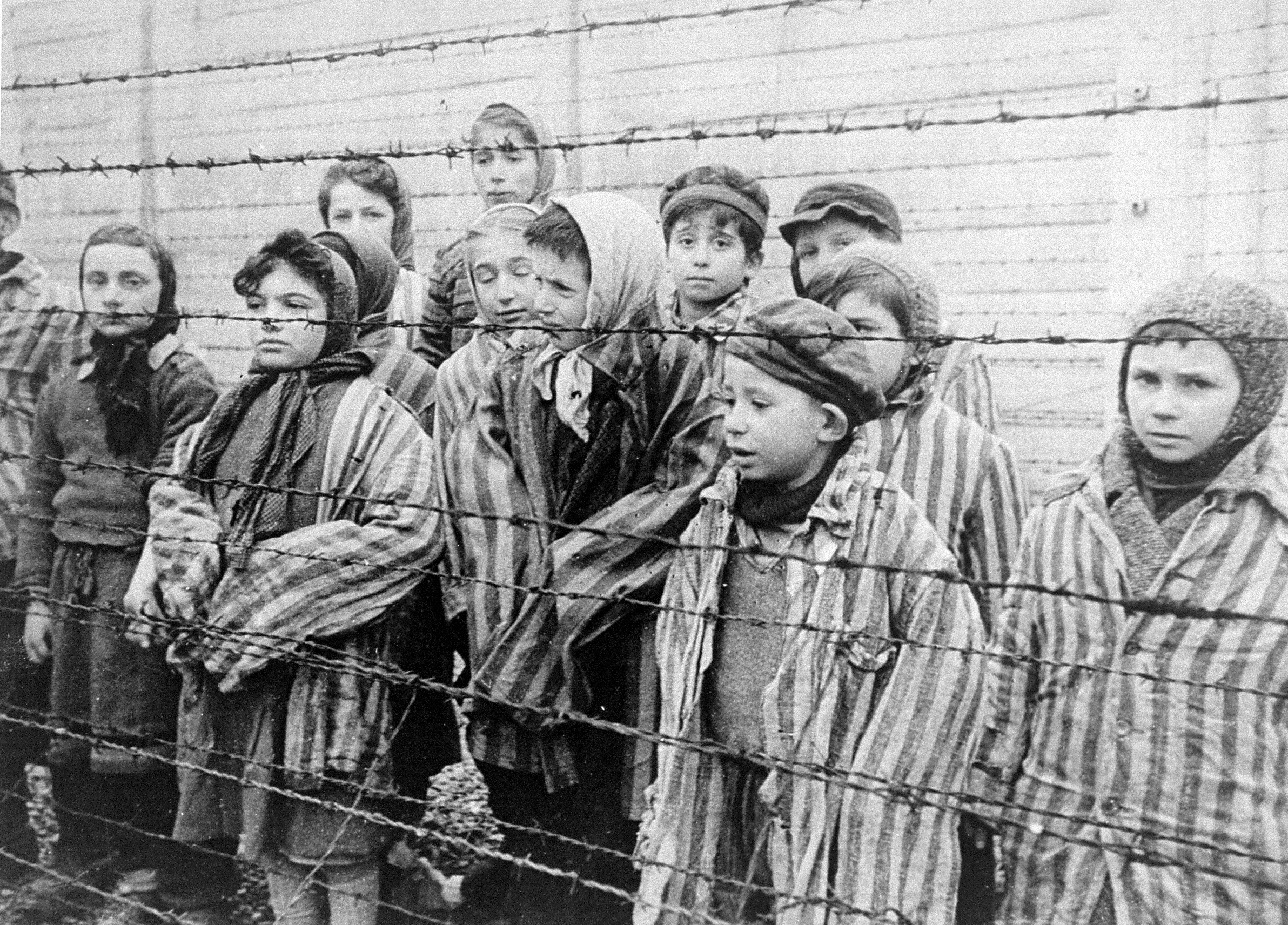
Nordisk:
Tema: Holocaust (Socialister.dk/arkivet)
Læren af Auschwitz (Socialistisk Information, 5. februar 2020)
“75 årsdagen for befrielsen af Auschwitz-Birkenau dødslejren udløste en forventelig bølge af kvalmende kommentarer fra ledende politikere. Neil Faulkner afslører hykleriet hos politikere, som ignorerer historiens lærdomme og udbreder nationalisme og racisme.”
Erindringen om Auschwitz. Af Kasper Mikael Jacek (Baggrund, 7. marts 2016)
“En udstilling i Krakow stillede sidste år spørgsmålet: Hvordan vil fremtidige generationer erindre Auschwitz? Men allerede siden 1945 har stedet været omdrejningspunkt for spørgsmål om, hvordan vi overhovedet kan og skal erindre, forstå og bruge koncentrations- og udryddelseslejren Auschwitz.”
Tysk jødeforfølgelse og udryddelse – 1933-45. Af Therkel Stræde (SFAH, januar 2018)
“Total fysisk udryddelse blev politikken imod jøderne i Tyskland og hele det Europa, der kom til at ligge indenfor Tysklands indflydelseszone, fra engang i 1941 og til den bitre ende.”
Erindringen om Auschwitz. Af Kasper Mikael Jacek (Baggrund, 7. marts 2016)
“En udstilling i Krakow stillede sidste år spørgsmålet: Hvordan vil fremtidige generationer erindre Auschwitz? Men allerede siden 1945 har stedet været omdrejningspunkt for spørgsmål om, hvordan vi overhovedet kan og skal erindre, forstå og bruge koncentrations- og udryddelseslejren Auschwitz.”
Fandt Holocaust virkelig sted? Af Thomas Hoffmann (Videnskab.dk, 26. januar 2015). Med links til relaterede artikler.
“Historiker Torben Jørgensen har 40 års erfaring med forskning i Holocaust. Her forholder han sig til de mest benyttede argumenter mod, at nazisternes masseudryddelse i bl.a. Auschwitz har fundet sted.” Se også Thomas Hoffmann: Holocaust benægtes for sjov (Videnskab.dk, 27. januar 2009).
”Vi må ikke gå som får til slagtebænken…”: Jødiske kvinder i væbnet antifascistisk modstand (Autonom Infoservice, 22. januar 2015)
“… en beretning om en gruppe modige jødiske kvinder, der deltog i den væbnede modstand mod deres bødler i lejren [Auschwitz-Birkenau].”
Auschwitz og folkedrabets århundrede. Af Loke Bisbjerg Nielsen (Modkraft.dk/Kontrodoxa, 28. januar 2013). Bl.a. om Levi, Adorno & Arendts holdninger.
Auschwitz, Marx och nittonhundratalet (pdf). Av Enzo Traverso (Röda Rummet, 2006, 86 s.; online på Marxistarkiv.se)
“Den bok är ursprungligen ett antal texter, närmare bestämt sex essäer, som publicerats i olika sammanhang. Under titeln Understanding the Nazi Genocide: Marxism after Auschwitz (1999) sammanställdes de och publice rades av Pluto Press.” Se om engelske udgave ovenfor.
Se Bertel Nygaards anmeldelse: Holocaust: Marxismen, fremskridtet og Auschwitz (Socialistisk Information, 30. januar 2015). Tidligere bragt i Socialistisk Information (nr. 43, juni 2000). “Bogen er en samling essays, skrevet i forskellige sammenhænge, men alle med det mål at arbejde hen imod den forståelse af Auschwitz og af de konsekvenster som dette barbari må have for marxismen og det socialistiske projekt.”
De materiella, sociala och ideologiska förutsättningarna för nazisternas folkmord (pdf). Av Ernest Mandel. Tillägg i Ernest Mandel: Andra världskriget: Vad det egentligen handlade om (Röda Rummet, 2005, s.134-137; online på Marxistarkiv.se)
“Ett föredrag som Mandels höll under ett symposium om nazismens folkmord i Bryssel 1988. Oversatt från Gilbert Achar (red), The Legacy of Ernest Mandel (Verso, 1999).”
Mengele – Dødens Engel. Af Louis Bülow (Modkraft.dk, 26. januar 2010).
“21 måneders nidkær tjeneste i Auschwitz gav Josef Mengele tilnavnet Dødens Engel. Kontradoxa markerer mindedagen for Auschwitz med et portræt af Josef Mengele.”
60-året for Krystalnatten + interview med Norman Finkelstein om ‘tyskernes kollektive ansvar’. Af Lene Junker (Socialistisk Revy, nr. 10, december 1998, s. 20)
Bl.a. om Daniel Jonah Goldhagens bog Hitler’s Willing Executioners.
Se også om Norman Finkelstein og bogen ‘Holocaust-industrien’ (2001) på Tidslinjen 8. december 1953.
[sta_anchor id=”litt” /]Litteratur
Dødens bolig: Auschwits-Birkenau. Af Peter Langwithz Smith (People’s Press, 2019, 700 sider). Se anmeldelser:
- Se anmeldelse af Joachim Lund: Auschwitz-bogen ’Dødens bolig’ en af de vigtigste danske faghistoriske bøger i mange år (Information.dk, 12. april 2019). Kræver abonnement.
- Anmeldelse Af Palle Andersen (Historie-Online, 10. april 2019): .. et ganske fremragende værk, hvor et stort og komplekst materiale formidles med et solidt overblik. … standardværket på dansk om Auschwitz-Birkenau i mange år frem.
Holocaust. Af Jacob Halvas Bjerre (Frydenlund, 2010, 142 sider). Se kildetekster, litteratur og links på His2rie.dk.
De nazistiske koncentrationslejre: studier og bibliografi. Redigeret af Therkel Stræde (Syddansk Universitetsforlag, 2009, 371 sider). Se anmeldelse på Historie-online.dk.
Auschwitz: en beskrivelse. Af Peter Langwithz Smith (Gyldendal, 2004, 432 sider). Se anmeldelse på Historie-online.dk.
Se også på Socialistisk Bibliotek:
- Tidslinjen: 31. juli 1919, om Primo Levi
- Tidslinjen: 18. juli 1925, om Adolf Hitlers Mein Kampf.
- Tidslinjen: 30. januar 1933, Hitler bliver Rigskansler.
- Tidslinjen: 15. september 1935, om Nürnberglovene.
- Tidslinjen: 20. januar 1942, om Wannsee-konferencen.
- Tidslinjen 19. april 1943, om ghetto-oprøret i Warszawa.
- Tidslinjen: 1. oktober 1943, om aktionen mod danske jøder/”jødeaktionen”
- Tidslinjen: 20. november 1945, om Nürnberg-krigsforbryderprocessen.
- Tidslinjen: 25. juni 1947, om Anna Franks Dagbog.
- Tidslinjen: 11. maj 1960, om Adolf Eichmann.
- Tidslinjen: 2. oktober 2009, om Mark Edelman og ghetto-opstanden.
- Linkboxen: 9. november – Krystalnatten 1938 og nu
- Linkboxen: Fascisme & Antifacisme
- Linkboxen: Anden Verdenskrig, 1939-1945
- Emneoversigten: Tyskland /Germany
















